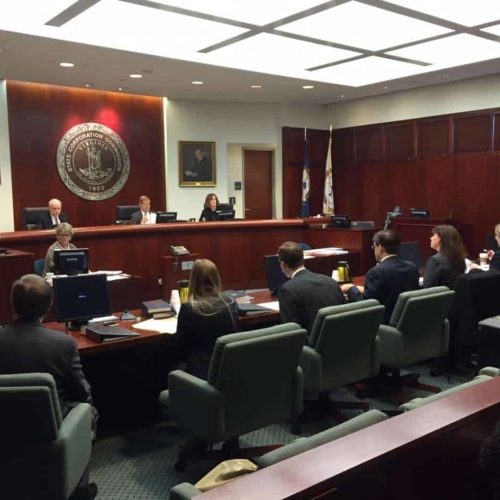Introduction
RICHMOND, Virginia — As the auto title-loan industry faces mounting criticism from Virginia lawmakers, state officials heard arguments today from three of the nation’s biggest lenders fighting to keep their sensitive financial reports from being made public.
The title loan companies — TitleMax of Virginia Inc.; Anderson Financial Services LLC, doing business as Loan Max; and Fast Auto Loans Inc. — argued during a Virginia State Corporation Commission hearing that disclosing the annual financial reports they file with the state could seriously harm their businesses.
The lenders said that release of the information such as the interest rates they each charge and how many cars they repossess from buyers who default on loans could be used by their competitors to gain an edge, or were “trade secrets” that should remain confidential.
“We fight very seriously for the business we have,” said Robert W. Loftin, an attorney for Loan Max.
After listening to the legal debate for nearly two hours, the three-member commission ordered the parties to submit more written arguments to justify their positions, giving them three weeks to complete.
Commissioners said they wanted to explore the industry’s claims that its reports should be considered “personal financial information” under the law, which would keep the records from public disclosure. The general counsel for the commission rejected that argument, saying the law is intended to shield the privacy of financial records of consumers, not giant loan companies. A final decision will come down to how commissioners interpret the law.
The hearing marks the latest round in a public records dispute between the Center for Public Integrity and the title loan firms, which operate in more than a dozen states. The commission regulates financial institutions in Virginia.
Erin Witte, who represented the Center for Public Integrity, told the commission the companies favor secrecy so they can “make more money.” She said the lenders are doing business with people “on the margins of society” and should be subjected to more scrutiny, not less.
“How is the General Assembly supposed to address abuses that are happening [as a result of title lending] if they don’t know what they are up to?” she asked.
The annual reports detail loan sales figures and other information about business practices, including how often the lenders are cited by regulators nationwide and how many cars they repossess from buyers who can’t repay loans. The reports don’t name borrowers.
In November, the Center for Public Integrity asked for copies of the 2014 reports from the Virginia Bureau of Financial Institutions, a division of the three-member corporation commission. Bureau officials said at the time they could find no legal basis to keep the reports confidential.
But when the lenders objected to the release of the reports, the commission agreed to hold a hearing before rendering a decision. This month, officials let the firms submit redacted versions of the reports, in which they disclosed little beyond the number of stores each runs in the state. The lenders contend that revealing the full contents of the reports would damage their businesses.
Car title loans are legal in about half the states. Lenders say they offer fast cash to people with poor credit and others whom banks won’t consider for loans. But title loans often come at a high cost: triple-digit interest rates, backed by the threat that borrowers who miss payments can swiftly lose their cars, according to a Center of Public Integrity investigation.
The high price of the loans has drawn fire from some lawmakers in Virginia, where nearly 500 storefronts offer title loans. The average interest rate charged in the commonwealth was 222 percent in 2014, according to state data. Prompted at least partly by critical media coverage of the costs, the Virginia General Assembly is considering legislation to crack down on the business practices, including a bill to cap interest rates at 36 percent annually.
Title lenders have fought off similar limits in other states, arguing rate caps would force them to close their doors.
Some states ban high-interest loans altogether under usury laws, while others have licensed and regulated title lenders for years. Yet there’s surprising little data to guide state policymakers in deciding how much interest is reasonable — or how much the public should be able to learn about the industry.
A Center for Public Integrity investigation published late last year found that oversight and disclosure policies vary widely nationwide. In Missouri, where all three of the Virginia title lenders also operate, financial reports are public records and anyone can request copies, for instance.
Yet regulators in other states either don’t require title lenders to file detailed financial data, including interest and default rates, or they keep information from these reports confidential.
Wisconsin officials, for instance, said they collect and examine title-loan sales figures for each company they license, but making the findings public is a felony.
In New Mexico, lawmakers took years to pass legislation allowing state officials to quiz lenders on the size and duration of loans, interest rates and other fees — and how often people lose their cars when they default.
Ready access to this data is “critical for both the public and policy makers,” said Ona Porter president and CEO of Prosperity Works, which advocates for working families in New Mexico.
Watchdog groups worry that many lenders don’t check if customers have the ability to repay loans. Porter said her group wants state officials to consider revoking the licenses of title lenders that repossess cars from more than 10 percent of customers.
But how aggressively state officials are enforcing regulations is hard to assess without knowing the lending practices of each licensed company, said Steve Fischmann, co-chair of the New Mexico Fair Lending Coalition, an advocacy group.
He said that state law gives officials the power “to withhold licenses from bad actors, but they are sitting on their hands.”
Consumer advocates in Illinois also contend they have a tough time evaluating title lenders when state officials shield their lending and repayment policies.
Since 2009, the Illinois Department of Financial and Professional Regulation has collected details of all loans the companies make, but it has refused to make that data public so others could analyze it. An advocacy group said in a report that they are unable to “fully assess the state of title lending in Illinois” as a result.
“It makes it really difficult to understand the impact of this type of predatory lending in communities,” said Lucy Mullany, a senior policy associate with the Heartland Alliance, an advocacy group that works to end poverty.
Though title companies argue that close inspection of their finances is bad for business, there’s little indication that’s happened in Missouri.
The three title lenders made a total of 76,467 loans in the state during 2014 for more than $85 million. The companies, or their affiliates, repossessed 11,632 cars from borrowers in Missouri during 2014. TitleMax dominates the Missouri market with about two-thirds of the loans and three quarters of the repossessions, state records show.
Read more in Inequality, Opportunity and Poverty
Finance
Washington state moves to protect mobile-home buyers
Effort prompted by investigation by Center for Public Integrity, Seattle Times, BuzzFeed
Finance
HUD loan investment program draws scrutiny
Congressmen ask about consumer protections in mortgage-selling program



Join the conversation
Show Comments